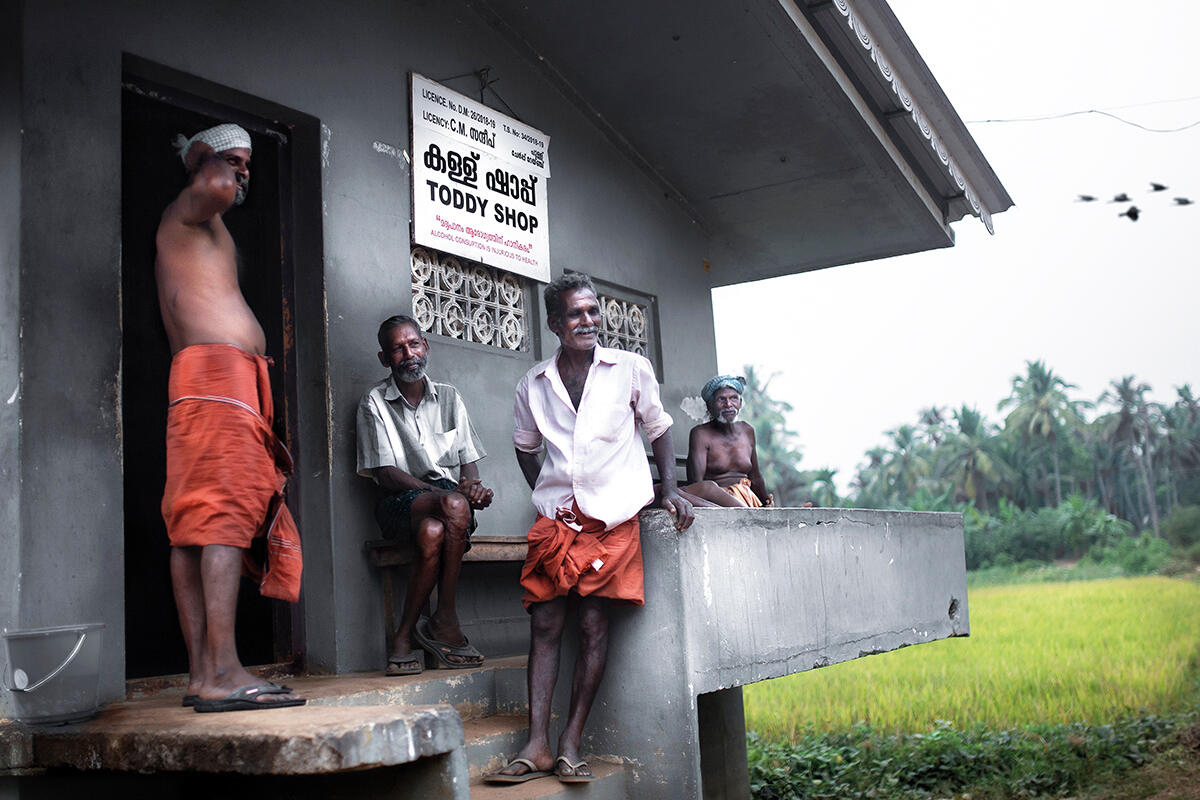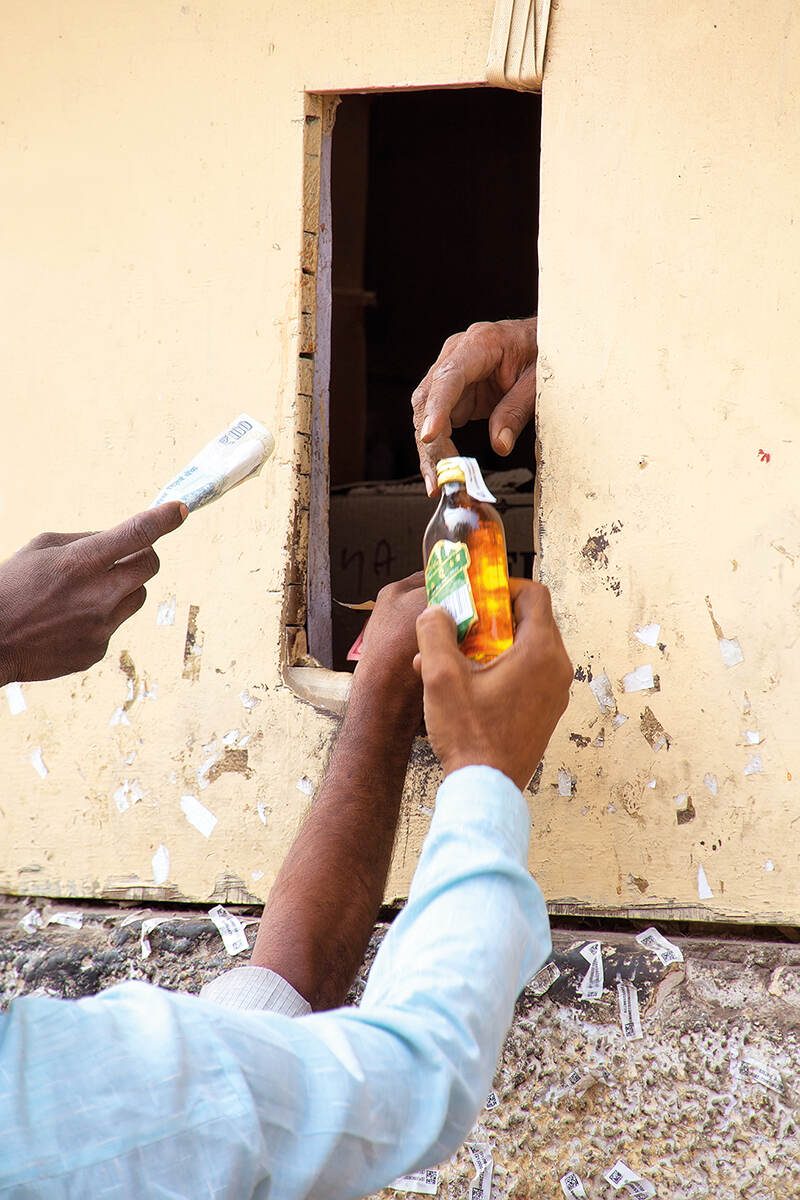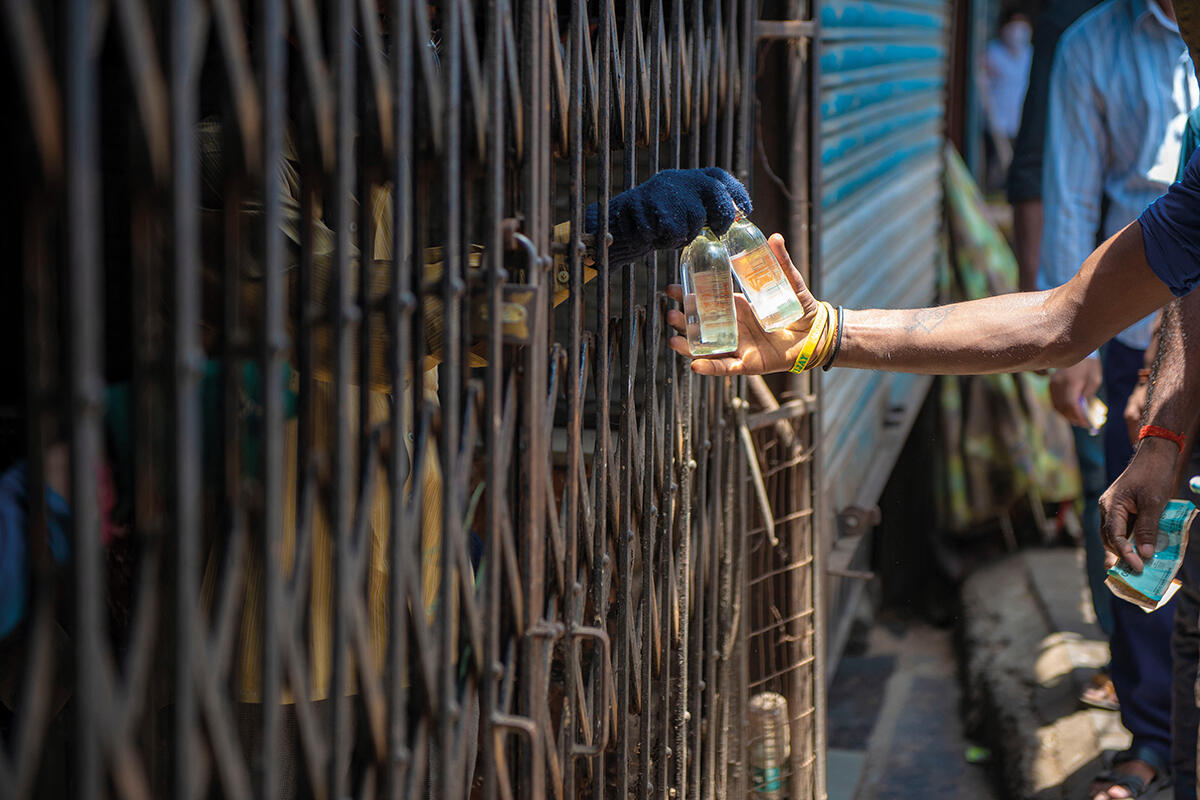
Ritwika Mitra reports on the growing movement of women confronting the linked problems of alcoholism and domestic violence in rural West Bengal
Having completed her household chores for the day, 40-year-old Tumpa Kha replays a video multiple times on her smartphone as she sits outside her home in Kumarapara village in eastern India’s West Bengal state on a scorching June afternoon. Her face bears a look of quiet vindication.
In the video, Tumpa confidently confronts an illegal liquor seller. Soon, she’s emptying two bottles of beer onto the road outside his illicit liquor shop. In another clip from the same day, Tumpa can be seen encouraging other women to smash bottles of beer. As children from the neighbourhood hover around, the men promise to throw away the bottles. However, the women insist that they will destroy the beer themselves.
Shifting on the ground to make herself comfortable, Tumpa is visibly emotional as she talks about her traumatic past. Married at 14, she spent much of her teenage and adult years suffering domestic abuse and severe financial distress.
Most days, her husband would return home drunk and physically assault her, prevent her from leaving the house and attack her again if she complained. He often spent all of their money on alcohol, meaning that there was no food at home for Tumpa and the children. ‘There was this one time when he put kerosene on me’, she says. ‘I have tolerated a lot!’
Although she knew her husband was to blame for the torture he inflicted on her over the years, she saw a pattern – the violence was worse when he was drunk.

ALCOHOL AND VIOLENCE
According to a 2019 Indian government survey on substance abuse, alcohol is the country’s most commonly used and abused drug, well ahead of cannabis, heroin and other opioids, cocaine and amphetamines. It also revealed that the vast majority of alcohol users are male (27.2 per cent of Indian men compared to 1.6 per cent of women).
A recent study in West Bengal revealed that in 85 per cent of cases of domestic abuse, there was a direct link to alcohol use and that one in four women between the ages of 18 and 49 who has been married has suffered violence committed by their husbands.
The Indian market is one of the fastest growing for alcoholic beverages globally, with a 6.8 per cent annual increase in sales over the past two years. In 2021, the Indian market had a total value of some US$52.5 billion. In most states in India, taxes levied on alcohol sales are among the most important source of government revenue.
Alcohol has a complex history in India. The temperance movement played a key role in the struggle for independence from British rule, and Mahatma Gandhi, the architect of the country’s eventual freedom, favoured total prohibition. Alcohol sales are currently banned in five of the 26 Indian states – Gujarat, Nagaland, Mizoram, Manipur and Bihar. However, there has long been a tradition of illegal brewing and distilling of alcohol – particularly in prohibition states, but also across much of rural India. In recent years, illicit production has dipped, prompted by a series of incidents in which people were killed by incorrectly made alcoholic drinks. In 2011, 167 people died in West Bengal when a batch of spirits was mixed with methanol, and last July, 36 were killed in the prohibition state of Gujarat. However, unlicensed drinking dens and shops in isolated rural areas, often selling legally made alcohol at inflated prices, have continued to flourish. The illicit trade in alcohol is often run by organised crime gangs.
TAKING ACTION
Three years ago, Tumpa decided to take matters into her own hands. She had heard of a growing movement of women protesting about the illegal liquor sales. A trade union, the Paschimbanga Khetmajoor Samity (PBKMS), was organising women in six districts of West Bengal; today, it has more than 6,000 women in rural areas involved. The women shut down illegal alcohol dens, stage protests against domestic violence and support victims.
When they discover alcohol being sold illegally in a village, they organise protest rallies, try to get the local police to act and sometimes confront the people selling the alcohol and destroy their stock.
The PBKMS hopes that the protests will draw the state authorities’ attention to the issue of alcohol abuse and the connected problems of domestic violence.
‘Our present stand is that we are not asking for prohibition,’ says Anuradha Talwar, a spokesperson for PBKMS. ‘As long as there is a demand, there will be a supply. So if we cut off the government supply, the illegal supply will start. If you go for prohibition and laws against liquor, it becomes an instrument of oppression of people who are poor and working class. People will be sent to prison for possessing even small quantities of liquor. So while we are not pushing for prohibition, we are against liquor and its encouragement through state policies. It is a tool used by the government and other political parties to make the poor lose sight of their rights and suppress working-class movements.’

According to Talwar, the campaign has seen more and more women taking direct action on their own initiative. ‘We are aiming for liquor-free villages where women take charge to ensure nobody enters a village drunk, and there is no nuisance,’ she explains. ‘Our ask is that the state supports us in these efforts.’
The women’s protests have yet to receive much in the way of political support. Most political parties are happy to promote alcohol sales because they generate so much tax revenue. However, the Socialist Unity Centre of India, a small leftist party, has started to campaign against the West Bengal state government’s stance on alcohol sales.
Campaigners argue that the state authorities have done little to clamp down on the illegal dens because they benefit from the taxes raised on the manufacture of beer and spirits; alcohol excise duty accounts for 12.5 per cent of West Bengal’s total tax revenues. Sales have boomed since Covid, with revenue up by 20 per cent compared to pre-pandemic and exceeding the excise department’s targets.
DOMESTIC ABUSE
Tumpa tells me that she now sees herself as an activist. ‘I feel very confident,’ she explains. ‘I want to teach a lesson to the illegal sellers of liquor. My mum is happy that I have stood up for myself. She asks if the other women will stand with me. She says that if [my husband] hits me, she will bring all of the other women to our home and beat him up. My mother cannot tolerate his behaviour anymore.’
Tumpa lives in her mother-in-law’s house; her own home was devastated by a cyclone in 2020, and she has no money to rebuild. Her husband now works in a city six hours away and comes back occasionally, but when he does, the drinking and beatings start again, and he runs up large debts at the illegal drinking shops in the village.
‘When a man in a family drinks, it is not only about the financial implications of it, but the violence perpetrated by the men when they return home drunk,’ Nandini Ghosh, from the Kolkata-based Institute of Development Studies, tells me. She adds that spousal violence remains more common in rural areas, with 31 per cent of rural married women having suffered emotional, physical or sexual violence compared to 27 per cent of their counterparts in urban areas.
However, Ghosh points out that domestic violence exists across society. ‘When it comes to violence, women in rural areas are more open to talking about it,’ she says. ‘Such communities are more aware of each other. Rural communities also tend to intervene in the face of violence, compared to urban areas, where violence is often happening behind closed doors.’

COMMUNITY ACTION
In Raghabpur village in West Bengal, about 15 women from a range of age groups gather on a September afternoon. They chat and gossip about the poor roads, what they cooked for lunch and the lack of work in the area. They are part of PBKMS’s growing protest movement. Soon, the discussion becomes more animated. They’ve gathered together to discuss the future direction of the struggle. The decision is unanimous – the target must be to curb the illegal sale of liquor, which is the cause of the violence in their homes. They exchange notes on the new dens that have cropped up in the past few weeks. The challenges are numerous, and a priority is to mobilise more women in the area to join them in their protests.
Sulekha Munda, in her early 20s, tells the other women how she found a roadside shop selling liquor surreptitiously when she went to buy chapatis a few days ago. The others ask her to be careful and not to tackle the shop alone. Another woman says that illegal liquor sellers have said that they would attack women if they came to shut the dens.
Community activist Suchitra Halder urges them to brainstorm ways to contribute to the movement in the coming days. She tells them about the importance of street theatres in spreading the message against the consumption of liquor. She also prods them to be more vocal about the consequences they face when their husbands return home drunk.
A light-hearted moment follows as a woman asks if Munda’s is a love marriage, and Halder jokes that it’s why her husband listens to her. ‘The root cause of our household problems is alcohol,’ Munda says. ‘If there is no alcohol, there is no hostility at home. My husband works as a driver. If he is drinking and I go to the den to call him back, he asks me to let him drink. He becomes hostile. I knew before marriage that he drinks, but I also thought that people change over time.’

For Parvati Munda, the worry is for her young boys, who are following in the footsteps of the men in the village. ‘You have to understand the ripple effects of alcohol,’ she tells the group. ‘If a man is drinking and a schoolchild sees him or his uncle drinking, they will also pick up on that. [The child’s] education will also suffer. He will also head to a liquor den and drink. As their guardians, we have to take charge of affairs. Otherwise, it won’t be long before they are derailed.’
Nationally, 1.3 per cent of 10–17-year-olds drink alcohol, but in West Bengal, that percentage is 3.9.
Balika, in her late 30s, says she can count the number of times she felt any companionship with her husband during the 20 years they’ve been married. Instead, she recalls seeking refuge with neighbours to escape her husband’s beatings and hiding the meagre money they had made as brick kiln workers to stop him spending it on alcohol. She describes how her relatives question why she stays in such an abusive marriage, but says that walking out of a marriage isn’t easy, especially when a woman’s reputation is so easily denigrated. Her anger is palpable as she talks about the illegal liquor dens. ‘My husband gets very cross that I go and crack down on the illegal dens, and he tells me it is their livelihood to sell liquor illegally.’
She says that when she’s demonstrating, she thinks of her husband. ‘I remember that he regularly gives the liquor dens our household money. Then these men go back home and torture their kids and wives.’
Halder, who is in her late 30s, says she joined the movement for the sake of her three sons, aged 16, 18 and 22. She wonders what will happen to them – they started drinking at a young age and are all now addicted to alcohol. ‘They come back home and do not pay any heed to us,’ she says. ‘My husband used to drink, but not anymore. Two of my sons dropped out of school at 15; the younger one is still studying. They drink where they have gone to work; they drink when they come here. They create so much of a ruckus that I cannot tolerate it. They vomit, become destructive, break things. It’s awful.’
When asked what they feel is the driving force behind the movement, a chorus emerges from the women: for their husbands, their sons and a healthy living environment.

They agree that despite feeling a sense of empowerment while protesting and confronting the sellers, there are also moments when they wonder whether things will change. After being shut down, the shops simply low for a few days before reopening. But Halder urges the women to keep at it. Describing the apprehension of an illegal vendor, she assures them that there has been progress. ‘There will be no change overnight,’ she says. ‘If the government has the will, things can change. So we have to keep fighting the system and we will eventually get results.’
Draupadi Sardar, who is nearing her 70s and has been a part of the movement for more than three decades, says that there’s no room for disillusionment. ‘My husband would drink from the very beginning of our marriage, and my three daughters have grown up in that environment. When they would protest, they would get beaten up too. They would stand between him and me when he came to beat me up. They would question why he was beating up their mother.’
Sardar’s husband is now dead, but her association with the movement continues. She goes to villages to raise awareness of domestic violence and its link with alcohol. ‘I do not feel disheartened. I feel good that we are standing by a woman suffering domestic abuse,’ she says. ‘I will continue my fight while I am alive.’




